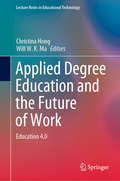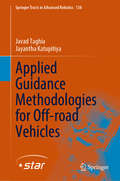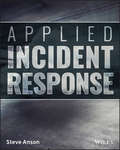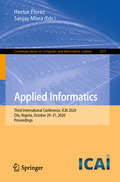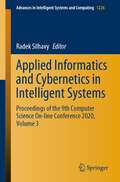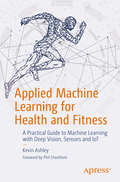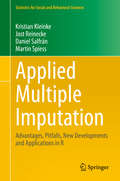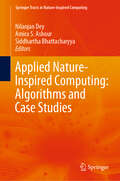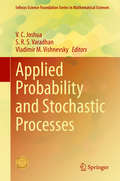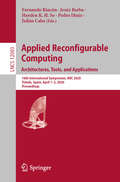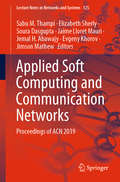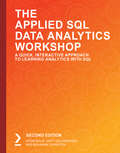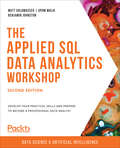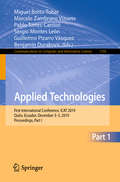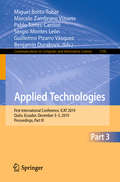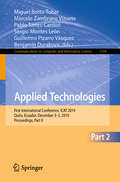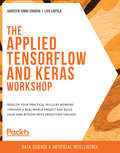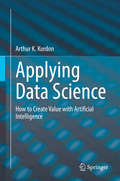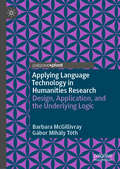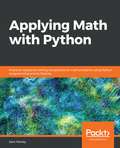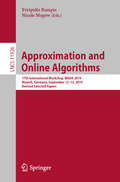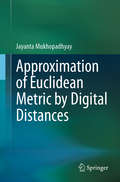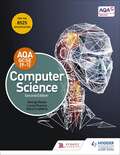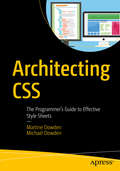- Table View
- List View
Applied Degree Education and the Future of Work: Education 4.0 (Lecture Notes in Educational Technology)
by Christina Hong Will W. K. MaThis edited volume sets the stage for discussion on Education 4.0, with a focus on applied degree education and the future of work. Education 4.0 refers to the shifts in the education sector in response to Industry 4.0 where digital transformation is impacting the ways in which the world of work and our everyday lives are becoming increasingly automated. In the applied degree sector, significant change and transformation is occurring as leaders, educators and partners evolve smart campus environments to include blended learning, artificial intelligence, data analytics, BYOD devices, process automation and engage in curriculum renewal for and with industries and professions. This volume aims to profile and enhance the contribution of applied educational practice and research particularly in the applied degree sector and includes contributions that show case real world outcomes with students and industry as partners. This edited volume includes a wide range of topics, such as rethinking the role of education and educators; curriculum and the future of work; industrial partnership, collaboration and work integrated learning; vocational and professional practices; students, industry and professions as partners; employability skills and qualities for the 21st century world of work; innovative pedagogy and instructional design; adaptive learning technologies; and data analytics, assessment and feedback. The contributors come from different parts of the world in higher education, including, Canada, China, Finland, Germany, Hong Kong, Italy, Macau, Singapore and the United Kingdom.
Applied Guidance Methodologies for Off-road Vehicles (Springer Tracts in Advanced Robotics #138)
by Javad Taghia Jayantha KatupitiyaThis book provides methodologies for designing and implementing guidance algorithms for autonomous vehicles. These algorithms make important decision regarding how to steer and drive a ground vehicle in order to safely stay on an intended path, thereby making the vehicle driverless. The design tools provided in this book enable the reader to develop highly practical and real-world implementable guidance algorithms that will deliver high-accuracy driving for field vehicles. (They are equally applicable for on-road vehicles.) The book covers a variety of vehicle types, including wheeled vehicles, tracked vehicles, wheeled and tracked vehicles towing trailers, and four-wheel-steer and four-wheel-drive vehicles. It also covers active trailers that are driven and steered. Vehicles used in agriculture, mining and road construction are subjected to unpredictable and significant disturbances. The robust control methodologies presented can successfully compensate for these disturbances, as confirmed by the experimental results presented. Though the majority of the methodologies presented are based on sliding-mode controllers, other robust control methodologies are also discussed. To help the reader decide which controller is best suited for his/her choice of vehicle, experimental results are presented in a comparative format.
Applied Incident Response
by Steve AnsonIncident response is critical for the active defense of any network, and incident responders need up-to-date, immediately applicable techniques with which to engage the adversary. Applied Incident Response details effective ways to respond to advanced attacks against local and remote network resources, providing proven response techniques and a framework through which to apply them. As a starting point for new incident handlers, or as a technical reference for hardened IR veterans, this book details the latest techniques for responding to threats against your network, including: Preparing your environment for effective incident response Leveraging MITRE ATT&CK and threat intelligence for active network defense Local and remote triage of systems using PowerShell, WMIC, and open-source tools Acquiring RAM and disk images locally and remotely Analyzing RAM with Volatility and Rekall Deep-dive forensic analysis of system drives using open-source or commercial tools Leveraging Security Onion and Elastic Stack for network security monitoring Techniques for log analysis and aggregating high-value logs Static and dynamic analysis of malware with YARA rules, FLARE VM, and Cuckoo Sandbox Detecting and responding to lateral movement techniques, including pass-the-hash, pass-the-ticket, Kerberoasting, malicious use of PowerShell, and many more Effective threat hunting techniques Adversary emulation with Atomic Red Team Improving preventive and detective controls
Applied Informatics: Third International Conference, ICAI 2020, Ota, Nigeria, October 29–31, 2020, Proceedings (Communications in Computer and Information Science #1277)
by Hector Florez Sanjay MisraThis book constitutes the thoroughly refereed papers of the Second International Conference on Applied Informatics, ICAI 2020, held in Ota, Nigeria, in October 2020. The 35 full papers were carefully reviewed and selected from 101 submissions. The papers are organized in topical sections on artificial intelligence; business process management; cloud computing; data analysis; decision systems; health care information systems; human-computer interaction; image processing; learning management systems; software design engineering.
Applied Informatics and Cybernetics in Intelligent Systems: Proceedings of the 9th Computer Science On-line Conference 2020, Volume 3 (Advances in Intelligent Systems and Computing #1226)
by Radek SilhavyThis book gathers the refereed proceedings of the Applied Informatics and Cybernetics in Intelligent Systems Section of the 9th Computer Science On-line Conference 2020 (CSOC 2020), held on-line in April 2020. Modern cybernetics and computer engineering in connection with intelligent systems are an essential aspect of ongoing research. This book addresses these topics, together with automation and control theory, cybernetic applications, and the latest research trends.
Applied Machine Learning for Health and Fitness: A Practical Guide to Machine Learning with Deep Vision, Sensors and IoT
by Kevin AshleyExplore the world of using machine learning methods with deep computer vision, sensors and data in sports, health and fitness and other industries. Accompanied by practical step-by-step Python code samples and Jupyter notebooks, this comprehensive guide acts as a reference for a data scientist, machine learning practitioner or anyone interested in AI applications. These ML models and methods can be used to create solutions for AI enhanced coaching, judging, athletic performance improvement, movement analysis, simulations, in motion capture, gaming, cinema production and more.Packed with fun, practical applications for sports, machine learning models used in the book include supervised, unsupervised and cutting-edge reinforcement learning methods and models with popular tools like PyTorch, Tensorflow, Keras, OpenAI Gym and OpenCV. Author Kevin Ashley—who happens to be both a machine learning expert and a professional ski instructor—has written an insightful book that takes you on a journey of modern sport science and AI. Filled with thorough, engaging illustrations and dozens of real-life examples, this book is your next step to understanding the implementation of AI within the sports world and beyond. Whether you are a data scientist, a coach, an athlete, or simply a personal fitness enthusiast excited about connecting your findings with AI methods, the author’s practical expertise in both tech and sports is an undeniable asset for your learning process. Today’s data scientists are the future of athletics, and Applied Machine Learning for Health and Fitness hands you the knowledge you need to stay relevant in this rapidly growing space.What You'll LearnUse multiple data science tools and frameworksApply deep computer vision and other machine learning methods for classification, semantic segmentation, and action recognitionBuild and train neural networks, reinforcement learning models and moreAnalyze multiple sporting activities with deep learningUse datasets available today for model trainingUse machine learning in the cloud to train and deploy modelsApply best practices in machine learning and data scienceWho This Book Is ForPrimarily aimed at data scientists, coaches, sports enthusiasts and athletes interested in connecting sports with technology and AI methods.
Applied Multiple Imputation: Advantages, Pitfalls, New Developments and Applications in R (Statistics for Social and Behavioral Sciences)
by Jost Reinecke Kristian Kleinke Daniel Salfrán Martin SpiessThis book explores missing data techniques and provides a detailed and easy-to-read introduction to multiple imputation, covering the theoretical aspects of the topic and offering hands-on help with the implementation. It discusses the pros and cons of various techniques and concepts, including multiple imputation quality diagnostics, an important topic for practitioners. It also presents current research and new, practically relevant developments in the field, and demonstrates the use of recent multiple imputation techniques designed for situations where distributional assumptions of the classical multiple imputation solutions are violated. In addition, the book features numerous practical tutorials for widely used R software packages to generate multiple imputations (norm, pan and mice). The provided R code and data sets allow readers to reproduce all the examples and enhance their understanding of the procedures. This book is intended for social and health scientists and other quantitative researchers who analyze incompletely observed data sets, as well as master’s and PhD students with a sound basic knowledge of statistics.
Applied Nature-Inspired Computing: Algorithms and Case Studies (Springer Tracts in Nature-Inspired Computing)
by Nilanjan Dey Amira S. Ashour Siddhartha BhattacharyyaThis book presents a cutting-edge research procedure in the Nature-Inspired Computing (NIC) domain and its connections with computational intelligence areas in real-world engineering applications. It introduces readers to a broad range of algorithms, such as genetic algorithms, particle swarm optimization, the firefly algorithm, flower pollination algorithm, collision-based optimization algorithm, bat algorithm, ant colony optimization, and multi-agent systems. In turn, it provides an overview of meta-heuristic algorithms, comparing the advantages and disadvantages of each. Moreover, the book provides a brief outline of the integration of nature-inspired computing techniques and various computational intelligence paradigms, and highlights nature-inspired computing techniques in a range of applications, including: evolutionary robotics, sports training planning, assessment of water distribution systems, flood simulation and forecasting, traffic control, gene expression analysis, antenna array design, and scheduling/dynamic resource management.
Applied Probability and Stochastic Processes (Infosys Science Foundation Series)
by V. C. Joshua S. R. S. Varadhan Vladimir M. VishnevskyThis book gathers selected papers presented at the International Conference on Advances in Applied Probability and Stochastic Processes, held at CMS College, Kerala, India, on 7–10 January 2019. It showcases high-quality research conducted in the field of applied probability and stochastic processes by focusing on techniques for the modelling and analysis of systems evolving with time. Further, it discusses the applications of stochastic modelling in queuing theory, reliability, inventory, financial mathematics, operations research, and more. This book is intended for a broad audience, ranging from researchers interested in applied probability, stochastic modelling with reference to queuing theory, inventory, and reliability, to those working in industries such as communication and computer networks, distributed information systems, next-generation communication systems, intelligent transportation networks, and financial markets.
Applied Reconfigurable Computing. Architectures, Tools, and Applications: 16th International Symposium, ARC 2020, Toledo, Spain, April 1–3, 2020, Proceedings (Lecture Notes in Computer Science #12083)
by Pedro Diniz Fernando Rincón Jesús Barba Hayden K. H. So Julián CabaThis book constitutes the proceedings of the 16th International Symposium on Applied Reconfigurable Computing, ARC 2020, held in Toledo, Spain, in April 2020. The 18 full papers and 11 poster presentations presented in this volume were carefully reviewed and selected from 40 submissions. The papers are organized in the following topical sections: design methods & tools; design space exploration & estimation techniques; high-level synthesis; architectures; applications.
Applied Soft Computing and Communication Networks: Proceedings of ACN 2019 (Lecture Notes in Networks and Systems #125)
by Sabu M. Thampi Elizabeth Sherly Soura Dasgupta Jaime Lloret Mauri Jemal H. Abawajy Evgeny Khorov Jimson MathewThis book constitutes best selected research papers presented at the International Applied Soft Computing and Communication Networks (ACN 2019) held in Trivandrum, Kerala, India during December 18 – 21, 2019. The papers are organized in topical sections on real time and multimedia communications, security and privacy, network management and software-defined networks, Internet of Things (IoT) and cyber-physical systems, intelligent distributed systems, mobile computing and vehicle communications, surveillance networks and visual intelligence, and emerging topics. The book is a reference for researchers and scientists engaged in various fields of intelligent systems.
The Applied SQL Data Analytics Workshop: A Quick, Interactive Approach to Learning Analytics with SQL, 2nd Edition
by Upom Malik Matt Goldwasser Benjamin JohnstonCut through the noise and get real results with a step-by-step approach to learning about SQL data analysis Key Features Ideal for SQL beginners who are getting started with data analytics for the first time A step-by-step SQL tutorial with exercises and activities that help build key skills Structured to let you progress at your own pace, on your own terms Use your physical print copy to redeem free access to the online interactive edition Book Description You already know that you want to learn data analysis with SQL, and a smarter way to learn is to learn by doing. The Applied SQL Data Analytics Workshop focuses on building up your practical skills so that you can navigate and compose custom reports like an expert data analyst. You'll learn from real examples that lead to real results. Throughout The Applied SQL Data Analytics Workshop, you'll take an engaging step-by-step approach to understand data analytics with SQL. You won't have to sit through any unnecessary theory. You can jump into a single exercise each day if you're short on time, or you can spend an entire weekend tinkering with SQLAlchemy and Python. It's your choice. Learning on your terms, you'll build up and reinforce key skills in a way that feels rewarding. Every physical print copy of The Applied SQL Data Analytics Workshop unlocks access to the interactive edition. With videos detailing all exercises and activities, you'll always have a guided solution. You can also benchmark yourself against assessments, track progress, and receive content updates. You'll even earn a secure credential that you can share and verify online upon completion. It's a premium learning experience that's included with your printed copy. To redeem, follow the instructions located at the start of your book. Fast-paced and direct, The Applied SQL Data Analytics Workshop is the ideal companion for SQL beginners. You'll perform SQL queries like a professional data scientist, learning along the way. This process means that you'll find that your new skills stick, embedded as best practice. A solid foundation for the years ahead. What you will learn Experiment with data analytics using basic and advanced queries Learn data interpretation through descriptive statistics and aggregate functions Export data from outside sources using powerful SQL queries Discover how to work with and manipulate data using SQL joins and constraints Speed up your data analysis workflow by automating tasks and optimizing queries Discover different advanced analytics techniques, including geospatial and text analysis Who this book is for Our goal at Packt is to help you be successful, in whatever it is you choose to do. The Applied SQL Data Analytics Workshop is an ideal tutorial for the beginner who wants to perform data analysis with SQL and is just getting started. Pick up a Workshop today, and let Packt help you develop skills that stick with you for life.
The Applied SQL Data Analytics Workshop: Develop your practical skills and prepare to become a professional data analyst, 2nd Edition
by Matt Goldwasser Upom Malik Benjamin JohnstonTake a step-by-step approach to learning SQL data analysis in this interactive workshop that uses fun exercises and activities to make learning data analytics for beginners easy and approachable. Key Features Explore ways to use SQL for data analytics and gain key insights from your data Study advanced analytics, such as geospatial and text analytics Discover ways to integrate your SQL pipelines with other analytics technologies Book Description Every day, businesses operate around the clock and a huge amount of data is generated at a rapid pace. Hidden in this data are key patterns and behaviors that can help you and your business understand your customers at a deep, fundamental level. Are you ready to enter the exciting world of data analytics and unlock these useful insights? Written by a team of expert data scientists who have used their data analytics skills to transform businesses of all shapes and sizes, The Applied SQL Data Analytics Workshop is a great way to get started with data analysis, showing you how to effectively sieve and process information from raw data, even without any prior experience. The book begins by showing you how to form hypotheses and generate descriptive statistics that can provide key insights into your existing data. As you progress, you'll learn how to write SQL queries to aggregate, calculate and combine SQL data from sources outside of your current dataset. You'll also discover how to work with different data types, like JSON. By exploring advanced techniques, such as geospatial analysis and text analysis, you'll finally be able to understand your business at a deeper level. Finally, the book lets you in on the secret to getting information faster and more effectively by using advanced techniques like profiling and automation. By the end of The Applied SQL Data Analytics Workshop, you'll have the skills you need to start identifying patterns and unlocking insights in your own data. You will be capable of looking and assessing data with the critical eye of a skilled data analyst. What you will learn Understand what data analytics is and why it is important Experiment with data analytics using basic and advanced queries Interpret data through descriptive statistics and aggregate functions Export data from external sources using powerful SQL queries Work with and manipulate data using SQL joins and constraints Speed up your data analysis workflow by automating tasks and optimizing queries Who this book is for If you are a database engineer who is looking to transition into analytics or someone who knows SQL basics but doesn't know how to use it to create business insights, then this book is for you.
Applied Technologies: First International Conference, ICAT 2019, Quito, Ecuador, December 3–5, 2019, Proceedings, Part I (Communications in Computer and Information Science #1193)
by Miguel Botto-Tobar Marcelo Zambrano Vizuete Pablo Torres-Carrión Sergio Montes León Guillermo Pizarro Vásquez Benjamin DurakovicThis first volume of the three-volume set (CCIS 1193, CCIS 1194, and CCIS 1195) constitutes the refereed proceedings of the First International Conference on Applied Technologies, ICAT 2019, held in Quito, Ecuador, in December 2019. The 124 full papers were carefully reviewed and selected from 328 submissions. The papers are organized according to the following topics: technology trends; computing; intelligent systems; machine vision; security; communication; electronics; e-learning; e-government; e-participation.
Applied Technologies: First International Conference, ICAT 2019, Quito, Ecuador, December 3–5, 2019, Proceedings, Part III (Communications in Computer and Information Science #1195)
by Miguel Botto-Tobar Marcelo Zambrano Vizuete Pablo Torres-Carrión Sergio Montes León Guillermo Pizarro Vásquez Benjamin DurakovicThis thirs volume of the three-volume set (CCIS 1193, 1194, 1195) constitutes the refereed proceedings of the First International Conference on Applied Technologies, ICAT 2019, held in Quito, Ecuador, in December 2019. The 124 full papers were carefully reviewed and selected from 328 submissions. The papers are organized according to the following topics: technology trends; computing; intelligent systems; machine vision; security; communication; electronics; e-learning; e-government; e-participation.
Applied Technologies: First International Conference, ICAT 2019, Quito, Ecuador, December 3–5, 2019, Proceedings, Part II (Communications in Computer and Information Science #1194)
by Miguel Botto-Tobar Marcelo Zambrano Vizuete Pablo Torres-Carrión Sergio Montes León Guillermo Pizarro Vásquez Benjamin DurakovicThis second volume of the three-volume set (CCIS 1193, CCIS 1194, and CCIS 1195) constitutes the refereed proceedings of the First International Conference on Applied Technologies, ICAT 2019, held in Quito, Ecuador, in December 2019. The 124 full papers were carefully reviewed and selected from 328 submissions. The papers are organized according to the following topics: technology trends; computing; intelligent systems; machine vision; security; communication; electronics; e-learning; e-government; e-participation.
The Applied TensorFlow and Keras Workshop: Develop your practical skills by working through a real-world project and build your own Bitcoin price prediction tracker
by Luis Capelo Harveen Singh ChadhaCut through the noise and get real results with this workshop for beginners. Use a project-based approach to exploring machine learning with TensorFlow and Keras. Key Features Understand the nuances of setting up a deep learning programming environment Gain insights into the common components of a neural network and its essential operations Get to grips with deploying a machine learning model as an interactive web application with Flask Book Description Machine learning gives computers the ability to learn like humans. It is becoming increasingly transformational to businesses in many forms, and a key skill to learn to prepare for the future digital economy. As a beginner, you'll unlock a world of opportunities by learning the techniques you need to contribute to the domains of machine learning, deep learning, and modern data analysis using the latest cutting-edge tools. The Applied TensorFlow and Keras Workshop begins by showing you how neural networks work. After you've understood the basics, you will train a few networks by altering their hyperparameters. To build on your skills, you'll learn how to select the most appropriate model to solve the problem in hand. While tackling advanced concepts, you'll discover how to assemble a deep learning system by bringing together all the essential elements necessary for building a basic deep learning system - data, model, and prediction. Finally, you'll explore ways to evaluate the performance of your model, and improve it using techniques such as model evaluation and hyperparameter optimization. By the end of this book, you'll have learned how to build a Bitcoin app that predicts future prices, and be able to build your own models for other projects. What you will learn Familiarize yourself with the components of a neural network Understand the different types of problems that can be solved using neural networks Explore different ways to select the right architecture for your model Make predictions with a trained model using TensorBoard Discover the components of Keras and ways to leverage its features in your model Explore how you can deal with new data by learning ways to retrain your model Who this book is for If you are a data scientist or a machine learning and deep learning enthusiast, who is looking to design, train, and deploy TensorFlow and Keras models into real-world applications, then this workshop is for you. Knowledge of computer science and machine learning concepts and experience in analyzing data will help you to understand the topics explained in this book with ease.
Applying Data Science: How to Create Value with Artificial Intelligence
by Arthur K. KordonThis book offers practical guidelines on creating value from the application of data science based on selected artificial intelligence methods. In Part I, the author introduces a problem-driven approach to implementing AI-based data science and offers practical explanations of key technologies: machine learning, deep learning, decision trees and random forests, evolutionary computation, swarm intelligence, and intelligent agents. In Part II, he describes the main steps in creating AI-based data science solutions for business problems, including problem knowledge acquisition, data preparation, data analysis, model development, and model deployment lifecycle. Finally, in Part III the author illustrates the power of AI-based data science with successful applications in manufacturing and business. He also shows how to introduce this technology in a business setting and guides the reader on how to build the appropriate infrastructure and develop the required skillsets. The book is ideal for data scientists who will implement the proposed methodology and techniques in their projects. It is also intended to help business leaders and entrepreneurs who want to create competitive advantage by using AI-based data science, as well as academics and students looking for an industrial view of this discipline.
Applying Language Technology in Humanities Research: Design, Application, and the Underlying Logic
by Barbara McGillivray Gábor Mihály TóthThis book presents established and state-of-the-art methods in Language Technology (including text mining, corpus linguistics, computational linguistics, and natural language processing), and demonstrates how they can be applied by humanities scholars working with textual data. The landscape of humanities research has recently changed thanks to the proliferation of big data and large textual collections such as Google Books, Early English Books Online, and Project Gutenberg. These resources have yet to be fully explored by new generations of scholars, and the authors argue that Language Technology has a key role to play in the exploration of large-scale textual data. The authors use a series of illustrative examples from various humanistic disciplines (mainly but not exclusively from History, Classics, and Literary Studies) to demonstrate basic and more complex use-case scenarios. This book will be useful to graduate students and researchers in humanistic disciplines working with textual data, including History, Modern Languages, Literary studies, Classics, and Linguistics. This is also a very useful book for anyone teaching or learning Digital Humanities and interested in the basic concepts from computational linguistics, corpus linguistics, and natural language processing.
Applying Math with Python: Practical recipes for solving computational math problems using Python programming and its libraries
by Sam MorleyThis book is for professional programmers and students looking to solve mathematical problems computationally using Python. Advanced mathematics knowledge is not a requirement, but a basic knowledge of mathematics will help you to get the most out of this book. The book assumes familiarity with Python concepts of data structures.
Approximation and Online Algorithms: 17th International Workshop, WAOA 2019, Munich, Germany, September 12–13, 2019, Revised Selected Papers (Lecture Notes in Computer Science #11926)
by Evripidis Bampis Nicole MegowThis book constitutes the thoroughly refereed workshop post-proceedings of the 17th International Workshop on Approximation and Online Algorithms, WAOA 2019, held in Munich, Germany, in September 2019 as part of ALGO 2019.The 16 revised full papers presented together with one invited paper in this book were carefully reviewed and selected from 38 submissions. Topics of interest for WAOA 2018 were: graph algorithms; inapproximability results; network design; packing and covering; paradigms for the design and analysis of approximation and online algorithms; parameterized complexity; scheduling problems; algorithmic game theory; algorithmic trading; coloring and partitioning; competitive analysis; computational advertising; computational finance; cuts and connectivity; geometric problems; mechanism design; resource augmentation; and real-world applications.
Approximation of Euclidean Metric by Digital Distances
by Jayanta MukhopadhyayThis book discusses different types of distance functions defined in an n-D integral space for their usefulness in approximating the Euclidean metric. It discusses the properties of these distance functions and presents various kinds of error analysis in approximating Euclidean metrics. It also presents a historical perspective on efforts and motivation for approximating Euclidean metrics by digital distances from the mid-sixties of the previous century. The book also contains an in-depth presentation of recent progress, and new research problems in this area.
AQA GCSE Computer Science, Second Edition
by George Rouse Lorne Pearcey Gavin CraddockUpdated specification; first teaching September 2020. Specification code: 8525Written by leading Computer Science teachers, this textbook will guide students through the updated AQA GCSE Computer Science specification topic by topic, and provide them with standalone recap and review sections, practice questions, worked examples and clear explanations of complex topics.This textbook:>> Prepares students for assessment with numerous practice questions for all topics>> Develops computational thinking skills>> Provides differentiated material with the 'beyond the spec' feature>> Includes standalone recap and review sections at the end of each chapter>> Provides definitions of technical terms, along with a glossary of words to ensure students feel confident with the assessment.AuthorsGeorge Rouse, Lorne Pearcey and Gavin Craddock are highly respected and widely published authors of resources.
AQA GCSE Computer Science, Second Edition
by George Rouse Lorne Pearcey Gavin Craddock Ian PagetUpdated specification; first teaching September 2020. Specification code: 8525Written by leading Computer Science teachers, this textbook will guide students through the updated AQA GCSE Computer Science specification topic by topic, and provide them with standalone recap and review sections, practice questions, worked examples and clear explanations of complex topics.This textbook:>> Prepares students for assessment with numerous practice questions for all topics>> Develops computational thinking skills>> Provides differentiated material with the 'beyond the spec' feature>> Includes standalone recap and review sections at the end of each chapter>> Provides definitions of technical terms, along with a glossary of words to ensure students feel confident with the assessment.AuthorsGeorge Rouse, Lorne Pearcey and Gavin Craddock are highly respected and widely published authors of resources.
Architecting CSS: The Programmer’s Guide to Effective Style Sheets
by Martine Dowden Michael DowdenLeverage various CSS features in combination with popular architectures in order to bring your style sheets back under your control. While CSS is the primary technology used for building beautiful web user interfaces, the style sheet files themselves are often quite ugly; left chaotic and unstructured through lack of a consistent architectural approach. By addressing the structure of your style sheets in the same way that you do with code, see how it is possible to create style rules that are clean and easy to read. Dig deep into CSS fundamentals and learn how to use the available selectors to build powerful rules.You will learn how to use cascading, inheritance, pseudo-classes, pre-processors, and components to produce cleaner, DRY-er style sheets, and how to let these features work for you instead of leading you down the road of rule duplication and design inconsistencies. Embrace the clean, semantic HTML to make your code easier to read, while supporting accessibility and assistive technologies.Separate the concerns of layout and style to simplify dynamic theming and white labeling, making you a marketing hero. Once you've finished this book you will have an advanced knowledge of CSS structures and architectural patterns that will take the pain out of style sheets for you (and your coworkers), and help you implement designs faster and easier than ever before. What You'll LearnUnderstand the core CSS fundamentals of Inheritance, Cascading, and SpecificityWork with architecture and design patterns for better organization and maintenanceMaximize code reuse with CSS precompilersReview the strengths and weaknesses of popular architecture patterns Who This Book Is For Primarily for front-end web developers and UI designers and anyone who works with CSS, particularly if they find it cumbersome and inelegant. It’s also suitable for software architects and tech leads who are responsible for the maintainability of their code base.
